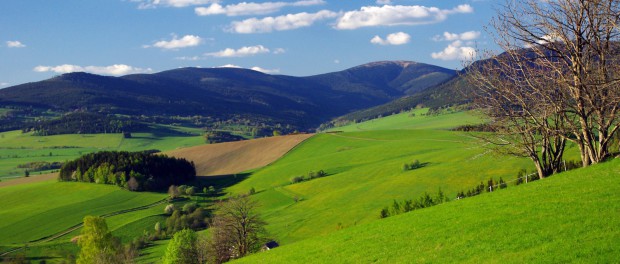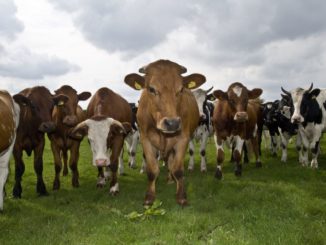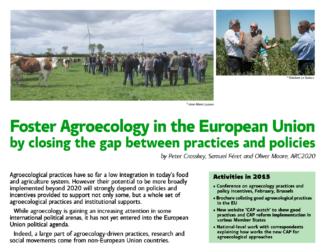
Czech Republic is the European Union country with the highest share of arable land, around 38% of its surface. Despite this fact, recent trends give clear evidence for an enormous decrease of agricultural land due to the expansion of urbanization and industrialization plans across the country. However the reformed Common Agricultural Policy (CAP) of the European Union (EU) could potentially push Czech Republic to promote an environmentally and socially sustainable agriculture.
The process of land degradation in Czech Republic has its roots in the agricultural land expropriations of the 1950s done by the communist regime. During that time agricultural policy focused mostly on the large-scale consolidation of farmlands as well as on highly intensive methods of production through the use of agrochemicals without consideration of potential environmental risks.
In light of the „Velvet revolution“ in 1989 the political and economic changes gave rise various agricultural currents, from agroindustry to organic farming. Already in 1990 the Ministry for Agriculture established its own department for „alternative agriculture“, handing out Governmental support in form of direct subsidies to organic farmers. In a short two years, the area devoted to organic agriculture increased from 480 hectares to 15.000 hectares and the number of farms grew rapidly.
Nonetheless, following the mainstream agricultural current of Western Europe, the agricultural sector felt obliged to undertake some other „necessary“ structural adjustments in order to stay competitive. Under the influence of the European free-market trends, privatization emerged, causing a massive transition of ownership from former state cooperatives towards domestic and multinational private businesses. The Czech state quickly lost interest in competing in the agricultural sector. In 2012 just 3,1% of the total national workforce was employed in agriculture and according to data from 2014, the contribution of the agricultural sector to the national GDP was not more than 2,3%.
Still, for some opportunists the agricultural business has become a lucrative source of income. For instance, Andrej Babiš, the second wealthiest businessman in the Czech Republic, and current Finance Minister, took this chance seriously. Agrofert Holding, his agriculture/food/chemistry/forestry/media conglomerate recorded last year a turnover of 5,5 million EUR. Moreover, Agrofert is the top Czech receiver of EU and national agricultural subsidies. The Finance Ministry is an active authority in disseminating agricultural subsidies in the country. Conflict of interests? For Babiš, also named the „Czech Berlusconi“ by national media, apparently not.
Since joining the EU in 2004, Czech Republic has adapted its policy to the provisions of the CAP. One could observe both positive and negative impacts on Czech agriculture. Unequal conditions for farmers across the EU, low protection of the domestic agricultural market and bureaucracy have been identified as the main barriers for agricultural development.
Beside this, Czech agricultural policy has not been sufficiently supportive towards its farmers either. Among the EU, Czech Republic provides one of the lowest rates of co-financing for its rural development programme. Although the Government approved an increase of co-financing percentage from 15% to 25% last year, this amount still remains low in comparison with other countries’ financial participation which is around 35%.
According to the National Strategic Rural Development Plan of the Czech Republic 2007 – 2013, the focus on sustainability and employment in the rural areas had become the main challenge for rural development, showing a slight change towards sustainability.
Remarkably, the Czech Republic is placed among those with the smallest number of farms within EU. However, the size of an average agricultural farm in 2010 was 152 ha much higher than the EU average of 14 ha. Another Czech peculiarity is the oversized share of leased land which stood with around 75% in 2014 for the second highest rate in Europe.
According to the Czech Statistics Office the area of the agricultural land decreased by 3,4% during the last ten years. Every day an arable land area about 14 hectares disappears – primarily because of industrial and residential developments. In other words, the powerful voice of developers lobbying for industrial projects (storage facilities and logistic parks) has become a very strong tool against the interests of the relative small percentage of Czech farmers.
Nevertheless, along the key areas of the CAP reform, the Czech Ministry for Agriculture announced an increase in direct payments for farmers following agroecological methods as well as for young farmers entering the agricultural sector, who would get 25% on the top of the basic payment for their first 90 hectares. Furthermore, increased subsidies would also concern vulnerable agricultural sectors like hops production and beef cattle breeding. „Intended changes are not supposed to be solely of an economic importance but they should also help to sustain employment in the rural areas,“ said Marian Jurečka, the Minister for Agriculture.
More good news comes through the proposed Action Plan for Development of Organic Farming for 2011 – 2015 which has been elaborated by a diverse range of stakeholders including the Czech Government, organic farmers, environmental organizations as well as research institutes and universities. Incentives like this followed an increase in the acreage dedicated to organic farming in the country. Within ten years the acreage of agroecological land increased from 255 000 hectares to more than 493 000 hectares and the number of organic farms during this period increased three fold. Currently, over 10% of agricultural land area in Czech is certified organic. Thus, there is a real demand for organic farming in Czech Republic. Will this demand be fulfilled? That remains a question.
Written By: Alžběta Srovnalová, Land Rights Campaign Intern for Eco Ruralis




